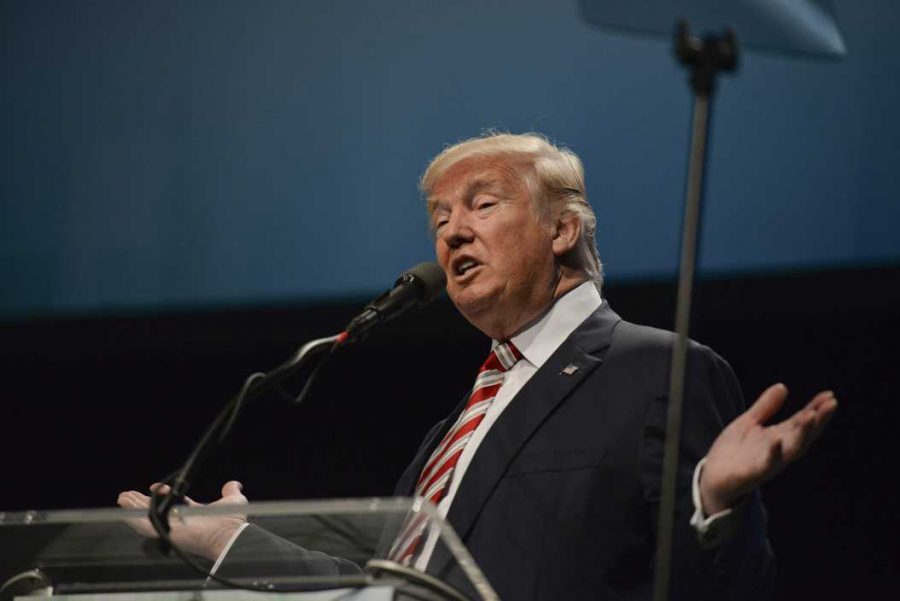Like a scared dog cornered in an alley, Donald Trump furiously lashed out after Hillary Clinton mentioned Alicia Machado’s name.
For Clinton, it was the perfect attack — all she had to do was bring up the former Miss Universe, who’s originally from Venezuela, at last week’s presidential debate and quote Trump to make the Republican candidate go on the defensive.
“He called this woman Miss Piggy. Then he called her Miss Housekeeping because she was Latina,” Clinton said.
The attack worked. On “Fox and Friends” the next morning, Trump tried to save his pride by calling the former Miss Universe winner the “worst we ever had,” and noting that she had “gained a massive amount of weight” after winning the pageant in 1996. Video footage from the time shows Trump spitting similar slurs about Machado.
Then on Friday, Trump dug in even deeper with a series of 5 a.m. tweets slandering Machado once more, suggesting this time that she had appeared in a sex tape — although there is no evidence that she has. It seemed that finally, after a campaign rife with sexism and slurs against women, Trump would finally be seen as the misogynist he is.
But then, The New York Times released his tax returns.
The Times published Trump’s 1995 tax returns it obtained for the first time on Saturday, revealing that Trump took advantage of tax loopholes and could have potentially avoided paying any federal income taxes for nearly two decades.
While claiming a $916 million loss in 1995, analysts conclude that such a large tax deduction could have canceled out an equivalent amount of taxable income for up to 18 years.
As a candidate who has built his campaign on his business acumen and understanding of U.S. tax laws, Trump’s tax returns are just as consequential — and front page-worthy — as his sexist comments. But that doesn’t mean that voters should forget about Machado and the vile things Trump has said about her and countless other women.
Trump benefits immensely from the “outrage culture” of this election. With so many scandals occurring one after the other, it becomes impossible to address all of them, essentially giving him a free pass.
So far, the trend has allowed Trump to get away with insulting Mexicans, a federal judge, America’s veterans and countless women. Now, with voting day just about a month away, voters need to bear in mind all of the insidious comments Trump has made about more than half of the population he’s trying to eventually represent.
Voters, over the next month, must perform the mental exercise of remembering that Trump is both an ineffectual businessman who has made billions on the backs of the people he claims to represent and an immoral man who holds no respect for women and minorities. Voters must remember that Trump’s character is just as important as his self-indulgent wealth.
While it is easy to do so, we cannot become numb to every scandal and offensive remark he creates. Every one of Trump’s missteps is overshadowed by the next one he’s involved in. Whether it’s on purpose or used as a distraction from his detrimental policies, it’s in Trump’s best interest for us to forget about his latest scandalous comment. When we vote in November, we should remember Trump’s history of body-shaming, power-grubbing and sexual harassment.
During his days in charge of the Miss Universe pageant, he subjected contestants to the “Trump Rule,” a form of the “hot or not” game that he used to decide who would be allowed to participate. And lest we forget the first Republican presidential debate in which Trump degraded moderator Megyn Kelly, calling her a “bimbo” and suggesting she had “blood coming out of her wherever.”
Let’s not allow Trump’s actions as a beauty pageant owner, and as a rampant misogynist, get lost among his litany of other atrocities. Electing him president would mean allowing someone who once said that women should be “punished” for having abortions, a decisive say in women’s rights.
Trump probably doesn’t pay his federal taxes. He thinks putting people out of their homes is “good business.” He referred to Mexicans as rapists and women in the workforce as “dangerous.”
Let’s remember this — and all of this — when we head to the polls in a month.


